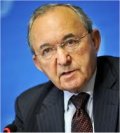
By: Richard J. Goldstone, Former Justice, Constitutional Court of South Africa, First Chief Prosecutor of the International Criminal Tribunal for Yugoslavia, and Regular Columnist, International Judicial Monitor Monitor
On August 22, 2011 the United Nations Human Rights Council
established the Independent International Commission of Inquiry on the Syrian
Arab Republic. It consisted of three members, Paulo Pinheiro, a Brazilian legal scholar, who
chairs the Commission; Karen Koning AbuZayd, an American diplomat; and Carla Del Ponte, the former Attorney General
of Switzerland and former Chief Prosecutor of the United Nations International
Criminal Tribunals for the former Yugoslavia (ICTY) and Rwanda (ICTR). The
brief of the commission is to investigate human rights violations and war
crimes in Syria since the conflict began in March 2011. However, the Government
of Syria has consistently refused permission for the members of the Commission
or members of its staff to enter Syria.
That egregious war crimes have been committed in Syria by the
military and by officials and members of both the Syrian government and rebel
groups cannot be doubted. There can also be no question that the situation in
Syria since the beginning of the war should have been referred by the Security
Council to the International Criminal Court (ICC). This has not happened only
because of the threatened exercise of its veto power by Russia. Since the
beginning of the conflict in 2011, Russia has been providing political
protection and military aid to the President of Syria, Bashar al-Assad. In
September 2015 the Russian military became directly involved in the fighting.
It is not likely in the coming years that Russia will support an investigation
by the ICC that is likely to implicate its own nationals as potential war
criminals. And, without a referral from the Security Council, the ICC has no
jurisdiction to investigate war crimes committed in Syria.
The website of the Human Rights Council records that: “Since
beginning its work, the Commission has produced over 20 reports, in addition to
numerous periodic updates, exposing human rights violations committed
throughout the country based on interviews with over 5,500 witnesses and
victims. The Commission’s investigations relied primarily on first-hand
accounts to corroborate incidents. Thousands of interviews have been conducted
thus far with people in camps and hospitals in countries neighbouring Syria as
well as by telephone and Skype with victims and witnesses inside the country.
The commission also reviews photographs, video recordings, satellite imagery,
forensic and medical, reports from Governments and non-Governmental sources,
academic analyses and United Nations reports. To make a finding, the commission
requires that incidents be corroborated to a level where the commission had ‘reasonable
grounds to believe’ that the incidents occurred as described.” This evidence
and, in particular, that of victims and eyewitnesses would be of substantial
value in prosecutions that might be instituted in coming years, whether in a
domestic or international court having jurisdiction.
In order to attempt to overcome the inaction by the Security
Council, the United Nations General Assembly, in December 2016, voted in favor
of establishing an independent, international mechanism to ensure
accountability for war crimes and crimes against humanity committed in Syria.
It is called the International, Impartial and Independent Mechanism. It is
charged with collecting evidence that might be used in cases in any court that
might have jurisdiction. It is significant that 105 nations voted in favor of
the resolution and only 15 against it. A French judge experienced in war-crimes
tribunals, Catherine Marchi-Uhel, was named to lead it. [see related article in this issue – “Special Report: The IIIM: A Justice Experiment in Geneva” by Iva Vukusic.]

 International
Judicial Monitor
International
Judicial Monitor